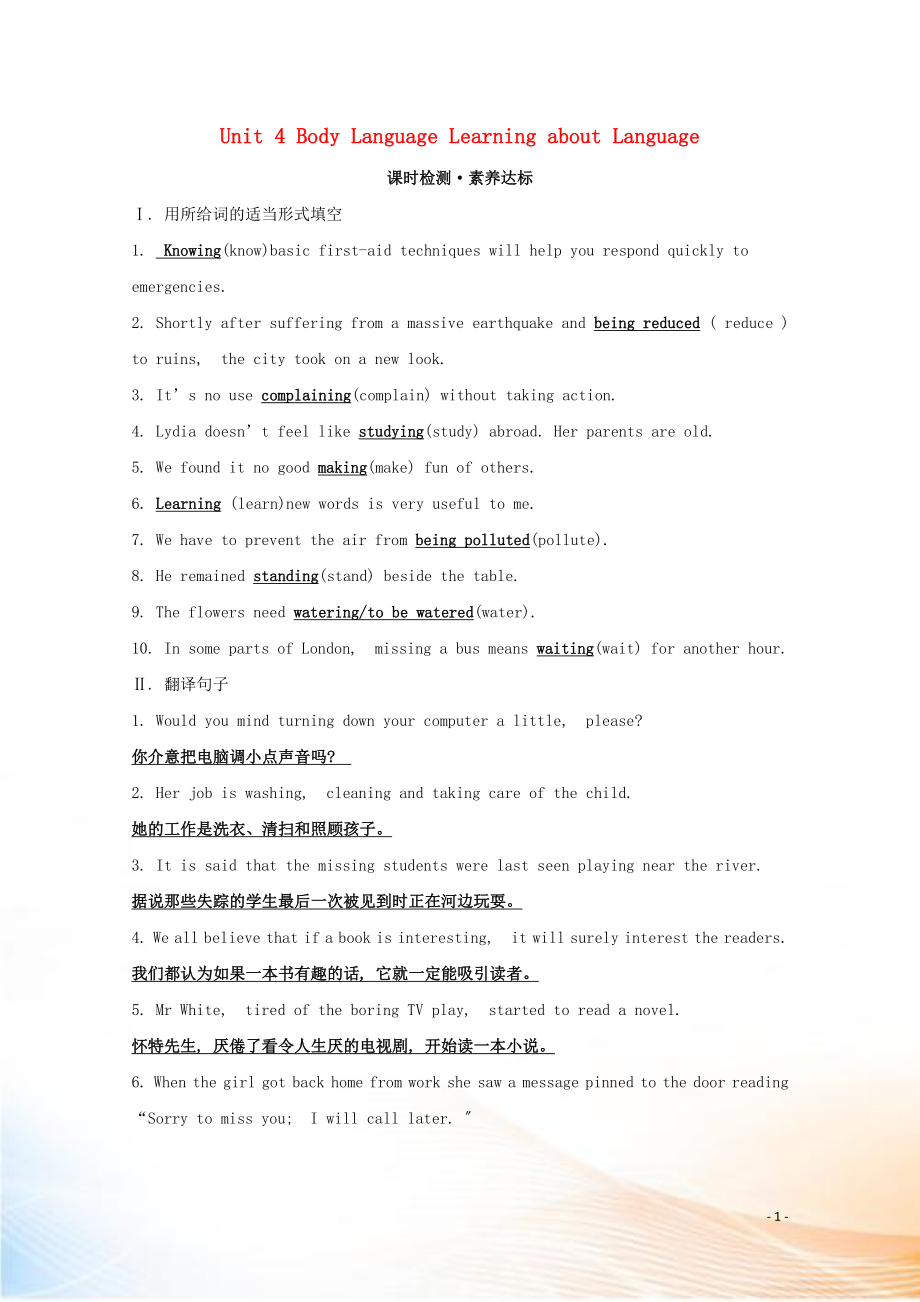《2022-2021學(xué)年新教材高中英語(yǔ) Unit 4 Body Language Learning about Language練習(xí) 新人教版必修1》由會(huì)員分享,可在線閱讀�����,更多相關(guān)《2022-2021學(xué)年新教材高中英語(yǔ) Unit 4 Body Language Learning about Language練習(xí) 新人教版必修1(3頁(yè)珍藏版)》請(qǐng)?jiān)谘b配圖網(wǎng)上搜索�。
1、
Unit 4 Body Language Learning about Language
課時(shí)檢測(cè)·素養(yǎng)達(dá)標(biāo)
Ⅰ. 用所給詞的適當(dāng)形式填空
1. Knowing(know)basic first-aid techniques will help you respond quickly to emergencies. ?
2. Shortly after suffering from a massive earthquake and being reduced ( reduce ) to ruins, the city took on a new look. ?
3. It’s
2�、 no use complaining(complain) without taking action.
4. Lydia doesn’t feel like studying(study) abroad. Her parents are old.
5. We found it no good making(make) fun of others.
6. Learning (learn)new words is very useful to me.
7. We have to prevent the air from being polluted(pollute). ?
8.
3、 He remained standing(stand) beside the table.
9. The flowers need watering/to be watered(water). ?
10. In some parts of London, missing a bus means waiting(wait) for another hour.
Ⅱ. 翻譯句子
1. Would you mind turning down your computer a little, please?
你介意把電腦調(diào)小點(diǎn)聲音嗎?
2. Her job is washin
4����、g, cleaning and taking care of the child.
她的工作是洗衣、清掃和照顧孩子����。
3. It is said that the missing students were last seen playing near the river.
據(jù)說(shuō)那些失蹤的學(xué)生最后一次被見(jiàn)到時(shí)正在河邊玩耍��。
4. We all believe that if a book is interesting, it will surely interest the readers.
我們都認(rèn)為如果一本書有趣的話, 它就一定能吸引讀者����。
5. Mr White,
5、 tired of the boring TV play, started to read a novel.
懷特先生, 厭倦了看令人生厭的電視劇, 開(kāi)始讀一本小說(shuō)��。
6. When the girl got back home from work she saw a message pinned to the door reading “Sorry to miss you; I will call later. 〞
女孩下班回到家, 她看到門上別著一個(gè)留言, 上面寫著: 很遺憾與你錯(cuò)過(guò), 之后我會(huì)打 給你。
7. The purpose of new teaching me
6��、thod is making study easier, not making it more difficult.
新的教學(xué)方法的目的是讓學(xué)習(xí)更簡(jiǎn)單, 而不是使它更困難�����。
8. The problem is worth discussing.
這個(gè)問(wèn)題值得討論��。
闡述講好中國(guó)故事��、學(xué)好中國(guó)文化的重要性(盡量多地使用動(dòng)詞-ing 形式)
1. 傳播中國(guó)傳統(tǒng)文化已經(jīng)成為一種流行趨勢(shì);
2. 許多外國(guó)人喜歡學(xué)中文;
3. 了解中國(guó)傳統(tǒng)文化使他們能夠更好地了解中國(guó);
4. 作為一名中國(guó)的高中生, 講好中國(guó)故事�、學(xué)好中國(guó)文化是我們的責(zé)任;
5. 我們要讓世界更好地
7、了解中國(guó)�。
___________________________________________________________________
___________________________________________________________________
___________________________________________________________________
【參考范文】
Spreading Chinese traditional culture has become a popular trend. Many foreigners enjoy learning Chinese. Learning Chinese traditional culture enables them to understand China better. As a Chinese high school student, speaking Chinese stories and learning Chinese culture well should be our responsibility. We should let the world know China better.
- 3 -
 2022-2021學(xué)年新教材高中英語(yǔ) Unit 4 Body Language Learning about Language練習(xí) 新人教版必修1
2022-2021學(xué)年新教材高中英語(yǔ) Unit 4 Body Language Learning about Language練習(xí) 新人教版必修1

